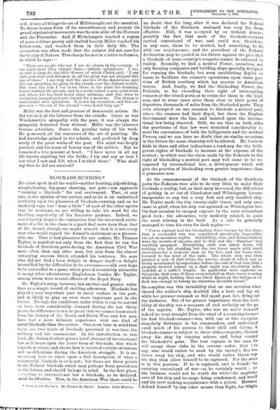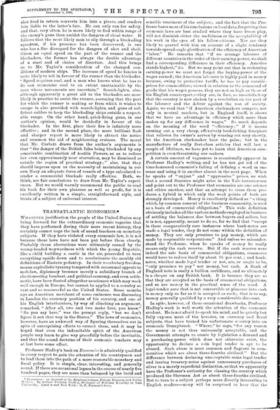BLOCKADE-RUNNING.*
No other sport in all the world—neither hunting, pig-sticking, steeplechasing, big-game shooting, nor polo—can approach "running a blockade" for real excitement. That, at any rate, is the opinion of our author, and as he is an undoubted authority upon the pleasures of blockade-running, and, as he modestly says, has "done a little" of each of the other sports that he mentions, we are willing to take his word for the thrilling superiority of his favourite pastime. Indeed, we could hardly dispute the contention that the interested excite- ment of a fox in the chase is a good deal more keen than that of the hound, though one might remark that it is not every man who would regard the former's excitement as a pleasur- able one. That it had pleasures for our author, Mr. Thomas Taylor, is manifest not only from the fact that he ran the blockade of Southern ports during the American Civil War more often than any other man, but also from the almost unvarying success which attended his ventures. No man who did not find a keen delight in danger itself—a delight intensified by the difficulties to be overcome—could ever hope to be successful in a game which proved irresistibly attractive to many other adventurous Englishmen besides Mr. Taylor, among whom were several officers of the Royal Navy.
Mr. Taylor's story, however, has another and greater value than as a simple record of exciting adventure. Blockade has played a very important part in naval warfare in the past, and is likely to play an even more important part in the future. Though the conditions under which it can be carried on have been considerably changed during the last thirty years, the difference is not so great that we cannot learn much from the history of the North and South War, and few men have had a more intimate experience with one kind of naval blockade than the author. One must bear in mind that there are two kinds of blockade practised in war-time, the military and the commercial. In his introduction to this book, Mr. Julian Corbett gives a brief abstract of international law as it bears upon the latter form of blockade, that which regards neutrals, and shows how it received certain extensions and modifications during the American struggle. It is un- necessary here to enter upon a full description of what a commercial blockade is or is not; but there are three points in the Federal blockade which may perhaps form precedents in the future, and should be kept in mind. In the first place, ;.ceording to international law a blockade, to be declared, must be effective. Now, in the American War there could be
• Running the Mode's. By Thomas B, Taylor. London: John Murray.
no doubt that for long after it was declared the Federal blockade of the Southern seaboard was very far from effective. Still, it was accepted by us without demur; possibly the fact that most of the blockade-runners carried contraband of war, and could not, therefore, in any case, claim to be neutral, had something, to do with our acquiescence; and the precedent of the Federal declaration may be quoted in the future against the plea that a blockade of some country's seaports cannot be enforced in reality. Secondly, we find a neutral Power, ourselves, not only forming companies and building ships specially designed for running the blockade, but even establishing depots or bases, to facilitate the runner's operations, upon those por- tions of British territory which lay nearest to American waters. And, finally, we find the blockading Power, the Federals, so far exceeding their right of intercepting runners at the closed ports as to cruise for them in the high seas, and in some cases seize them close to their point of departure, thousands of miles from the blockaded ports. They even attempted on one occasion to blockade a neutral port, where the runners had their dept5t, but there the English Government drew the line, and insisted upon the interna- tional law being observed. Still, we see that on both sides the provisions of that law were stretched considerably to meet the convenience of both the belligerents and the neutral Powers, and we can have no doubt that on similar occasions in the future the same elasticity will be allowed. Mr. Corbett finds in these and other indications a tendency for the belli- gerent rights of blockade to increase at the expense of the neutral ; in which case the claim made by the Federals to the right of blockading a neutral port may well come to be re- cognised by international law, a development which will give the practice of blockading even greater importance than it possesses now.
At the commencement of the blockade of the Southern ports the Federals were able to do very little to make their blockade a reality, but, as their navy increased, the difficulties of getting in or out of Charleston and Wilmington became insuperable to any but a very fast and ably handled ship. Mr. Taylor made the trip twenty-eight times, and only once came to grief, when his ship ran aground on Wilmington bar. On that occasion he escaped capture by the most miraculous good luck; the adventure, very modestly related, is quite the most stirring in the book. As a rule he generally managed to time hie runs for dark nights :- " For so vigilant had the blockading force become by this time, that a successful run was considered practically impossible, except on moonless nights. Invisibility, care, and determination were the secrets of success, and to this end the `Banshee' was carefully prepared. Everything aloft was taken down, till nothing was left standing but the two lower masts with small cross-trees for a look-out man on the fore, and the boats were lowered to the level of the rails. The whole ship was then painted a sort of dull white, the precise shade of which was so nicely ascertained by experience before the end of that war, that a, properly dressed runner on a dark night was absolutely indis- cernible at a cable's length. So particular were captains on this point, that some of them even insisted on their crews wearing white at night, holding that one black figure on the bridge or on deck was enough to betray an otherwise invisible vessel."
So complete was this invisibility that on one occasion whet chased the author's ship doubled like a hare and lay Ai' while her pursuer steamed at full speed past her, firing int the darkness. But of far greater importance than the invis bility of the ship was a measure of cool audacity on the pa of the captain. Mr. Taylor, who was no sailor himself• indeed he went straight from the stool of a counting-house)
his first blockade-runner—was, with one or two exceptiol. singularly fortunate in his commanders, and undoubtey owed much of his success to their skill and daring. A.
blockade-runner is subject to three risks,—capture, throng away his ship by running ashore, and being sunkoY the blockader's guns. The best captain is the man ho will accept those risks in the reverse order, that i to say, who would rather be sunk by the enemy's fir Ian throw away his ship, and who would rather throw vay hie ship than allow himself to be captured. For the /tiler is in this position. If he is captured, and is found) be carrying contraband of war—as he certainly would or the business would not be worth his while—he maynake sure of his ship and its cargo being condemned, and =elf and his crew making acquaintance with a prison. Mannot defend himself by any other means than flight, for single shot fired in return converts him into a pirate, and renders him liable to the latter's fate. He can only run for safety, and that, very often, he is more likely to find within range of the enemy's guns than amidst the dangers of shoal water. It follows that the most likely man to slip through a blockading squadron, if his presence has been discovered, is one who has a fine disregard for the dangers of shot and shell. Given an equal speed on the part of the runner and the blockaders, the former has always the double advantage of a start and of choice of direction. And this brings us to Mr. Taylor's consideration of the changed con- ditions of modern ships. The increase of speed he fancies is more likely to tell in favour of the runner than the blockader. " Speed requires coal, and a man who knows what he has to do can economise coal to an extent unattainable by the man whose movements are uncertain." Search-lights, also, although apparently a great aid to the blockader, are more likely in practice to assist the runner, assuming that the port for which the runner is making or from which it wishes to escape is also provided with search-lights, and guns of suf- ficient calibre to keep the blockading ships outside a respect- able range. On the other hand, quick-firing guns, in our author's opinion, would be decidedly in favour of the blockader. In the first, place their fire is infinitely more effective ; and in the second place, the more brilliant flash and sharper report is more likely to attract the notice and summon the aid of neighbouring cruisers. The moral that Mr. Corbett draws from the author's arguments is that " the danger of the British Isles being blockaded by any conceivable combination of hostile Powers, so as to reduce her even approximately near starvation, may be dismissed as outside the region of practical strategy ; " also, that they should impress upon us the necessity of maintaining in our own Navy an adequate force of vessels of a type calculated to render a commercial blockade really effective. Both, we think, are fair conclusions to draw from Mr. Taylor's experi- ences. But we would warmly recommend the public to read his book for their own pleasure as well as profit, for it is excellently written in a simple, straightforward style, and treats of a subject of universal interest.























































 Previous page
Previous page